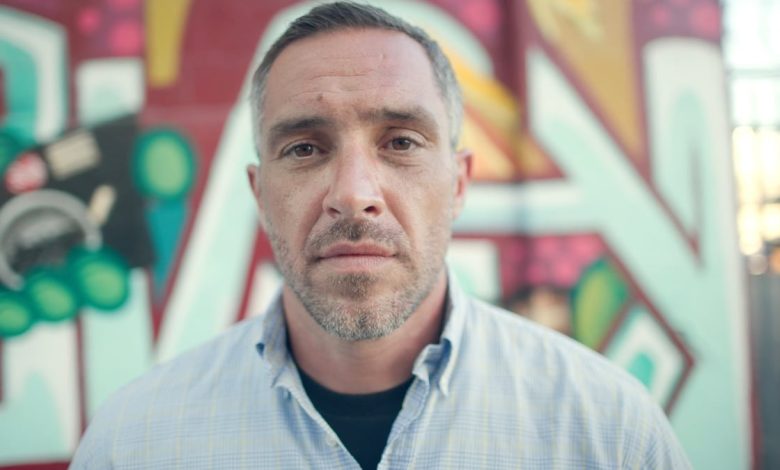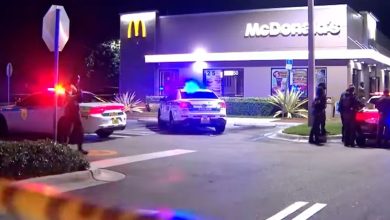New doc follows vets’ fight for housing

Until you see a camera pan over the long row of Coleman tents lining the sidewalk, nearly all with American flags neatly affixed to the front, the outrage of a veteran-specific homeless community in the heart of Los Angeles might not fully resonate. When the image is paired with the sprawling and partially empty Department of Veterans Affairs campus this homeless “Veterans Row” abuts, the dissonance is complete. Los Angeles is, we learn, the nation’s hub for veteran homelessness, with an estimated 4,000 unhoused vets.
In “The Promised Land,” a new short documentary by Army veteran Rebecca Murga for reporting studio Long Lead, creators are counting on those striking visuals to communicate a message 100 news stories might not.
The documentary, released on Long Lead’s website and recently screened before an audience of veteran advocates in Washington, D.C., took shape out of Murga’s own curiosity as a Los Angeles resident who often passed by those tents.
“My interest was already piqued at, what’s been happening, and why aren’t these buildings being used,” Murga said in a phone interview.
RELATED
As it happened, her embarkation on the project came as this open-air veteran enclave became national news through a class-action lawsuit in federal court. The complaint in the suit, brought in December 2023 by 14 veterans, was also at the heart of Murga’s story: the vets’ argument that the West Los Angeles VA Medical Center had to follow through on its commitment to build more than 1,000 permanent supportive housing units for veterans.
Days after the 23-minute documentary’s D.C. screening, relevant news broke: The U.S. Department of Housing and Urban Development announced it would change a rule that counted veterans’ disability benefits as income, a policy that excluded some Los Angeles vets from VA housing eligibility.
In the documentary, Robert, an Air Force veteran eventually admitted into one of the VA’s roughly 250 housing units, decries the situation.
“I have a beautiful view of the ocean,” he says, gesturing to the veteran standing next to him wearing a prosthetic leg. “He lost his leg in Afghanistan saving another soldier. … He gets to be homeless on the streets of L.A.”
But meaningful change is still a work in progress, said John Patrick Pullen, founding editor of Long Lead.
“I don’t think it’s a done deal, and I wish I could be more optimistic about it,” Pullen said. “It’s definitely not a fix, because even if that policy changes, and all the veterans who need housing are able to get cleared and stay in that housing, there’s not enough housing on that (VA) property.”

The Long Lead documentary makers don’t see themselves as advocates, though their point-of-view comes through clearly in the film. For Murga, the top priority was preserving the dignity of subjects all too accustomed to exploitation: military veterans and the unhoused.
“You can’t just show up with a camera, because a lot of people have done that before,” she said. “You know, they show up with a camera, they take a few photos and you never hear from them again.”
First, she had to earn the trust of Rob Reynolds, an Army vet who’s been described as the “de facto manager of Veterans’ Row.” A formerly unhoused veteran, he’s a plaintiff in the lawsuit and a self-appointed advocate and protector of the veterans still seeking housing. Earning her way into the circle took years, Murga said. She felt spending Thanksgiving with the veterans, and filming as they shared a hot meal, helped assure them of her intentions.
“That was the first time they offered to show me where they lived and inside their homes and stuff like that,” she said.
A few prominent personalities emerge in the film, including Josh, a tattooed, harmonica-playing Army infantryman who’d just been denied on-campus VA housing. Later, he’s joined by Derek, another former Army grunt with a big personality who rides a bike and wears a beanie over his long, strawberry-blond hair. Derek, who’d recently moved into one of the temporary VA tiny homes constructed during the pandemic, says his lodging is like a “10-star hotel” compared to living on the street.
“There goes the neighborhood,” Josh jokes. “Two 11 bravos in one place, what are we going to do.”
It’s jarring when, later in the film, we find out Derek has died due to an apparent drug overdose, a month after finally getting moved into permanent housing.
Murga found out about Derek’s death as her cameras were rolling. Despite her heartbreak, she realized she had to include the moment in the film.
“We don’t know the numbers of people who have died (on the street),” she said. “I thought it was important to include him, because he was so sweet and so kind and so open, and because he had been waiting so long.”
The class-action lawsuit went to trial in early August in U.S. District Court in the Central District of California. Long Lead is publishing updates, as many as one a day, on its website as arguments progress.
“We’re going to keep pressing with it,” Pullen said. “I think that it’s something that everybody should see and understand, whether they live in Los Angeles or not. Because this is a nationwide epidemic.”
Read the full article here





